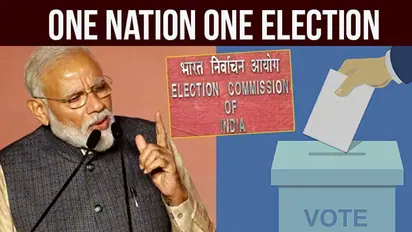
Bengaluru: During his address at the concluding session of 80th All India Presiding Officers Conference, PM Modi emphasised the need of 'One Nation, One Election.'
He said, "There is one more subject which is very important which is of 'One Nation, One Election'. This isn't just an issue of deliberation but also the need of the country. Every few months, there are elections happening in some or the other states. It hampers the developmental work and all of you know about it. For this, we must think seriously and office-holders can lead deliberations on this. Only one voter list should be used for Lok Sabha, Vidhan Sabha and other elections”.
He further added, "We have to chalk out a path for this. Why're we wasting time and money on these lists? Now, everyone above the age of 18 is eligible to vote. Earlier there were a few changes but now everything is clear. The time for complete digitization is here. The common man must have data for the functioning of every House and every House in the country should also have such data.”
Well, India is a land in which democracy thrives. It has myriad cultures, with heterogeneity as its definition. But when it comes to voting, the country sees elections round the year, with some or the other state finishing its term or the governments collapsing prematurely due to various reasons.
And once in five years, the Lok Sabha elections have to be held to install a Central government, which shapes the destiny of the nation.
Though there is the Election Commission of India, a constitutional body that conducts elections, it is certainly a herculean task. Therefore, the Modi government has revived this idea of 'one nation, one election'.
This is a concept in which elections are held concurrently or ubiquitously for both the Lok Sabha and the state elections. The voting can be held on the same day or can be held in a phased manner.
Though Modi broached this topic to glean through various aspects, one must note that the concept of 'one nation, one election' was in existence until the year 1967, after which, due to dissolution of various state governments in the following years, it became impractical to hold elections simultaneously.
But what are the pros and cons of the concept? Here are the views of experts.
“Though it is a good concept in that it saves a lot of time and money and helps focus on good governance, practically, there will be a lot of difficulties. For example, if a government falls prematurely, what next? The dynamics of each state are different. The government has to address such things before thinking of its implementation,” says Vijay Rao, a psephologist.
Pros:
• Holding elections at the same time will dramatically reduce the burden on the state ex-chequer.
• They will help the governments to focus on development and not be on election mode consistently.
• Will prod or encourage the voters to turn out in large numbers once in five years. The chances of viewing adult suffrage as a rigmarole rather than a holistic exercise will be lessened.
Cons:
• Though the costs will be reduced, may argue that sustaining democracy is most important at all costs.
• Though they help governments focus on development, they provide an opportunity for the governments to become complacent once they get into power.
• Lastly, if a government collapses prematurely, there is no clarity on whether there will be polls or whether President’s rule will be imposed.